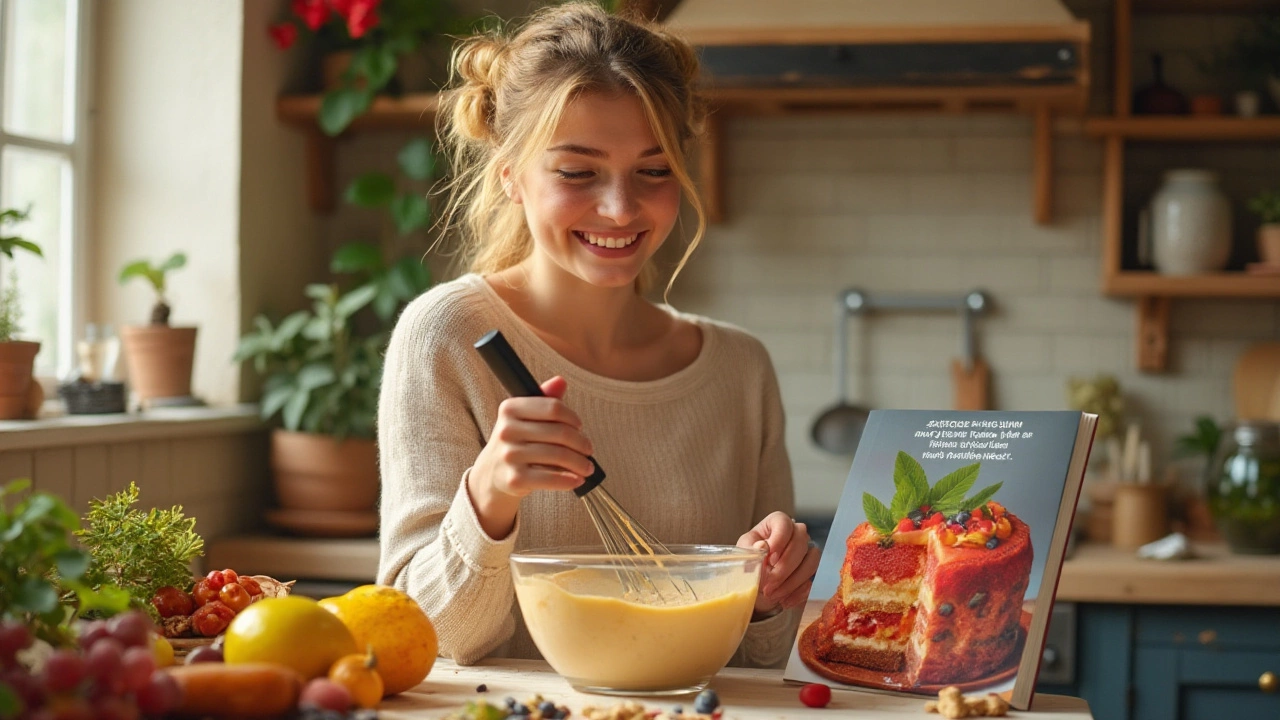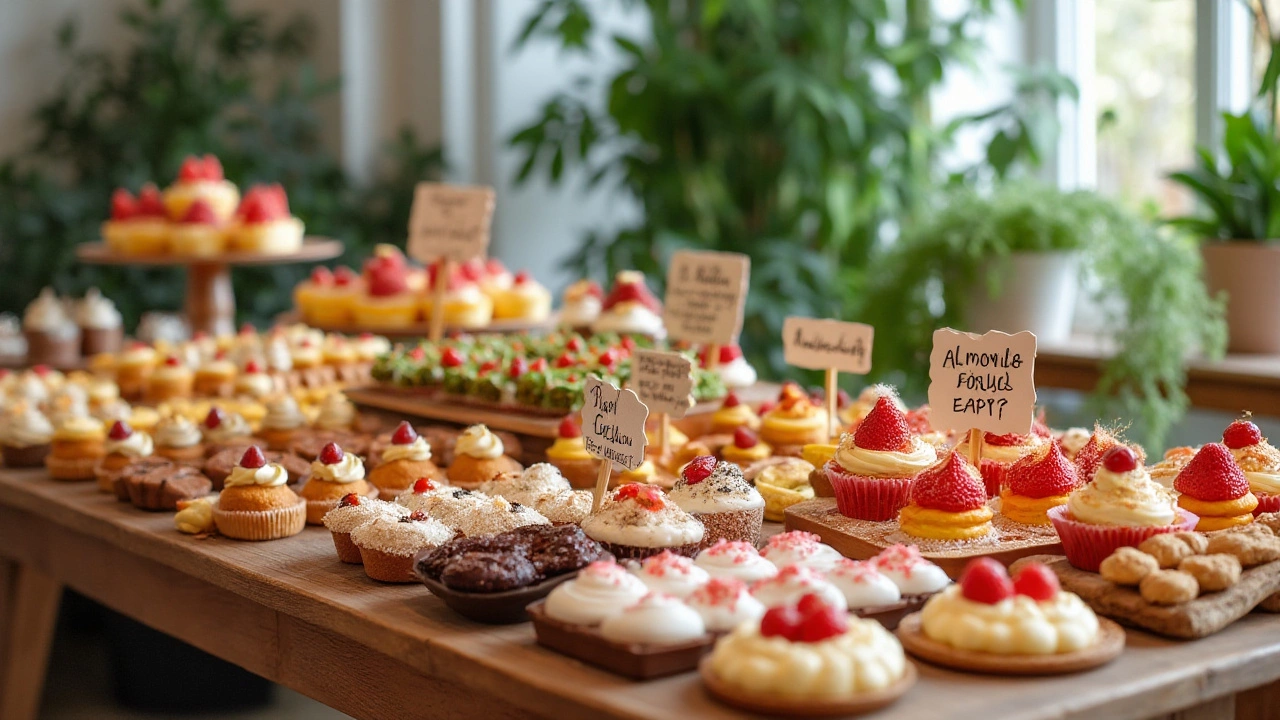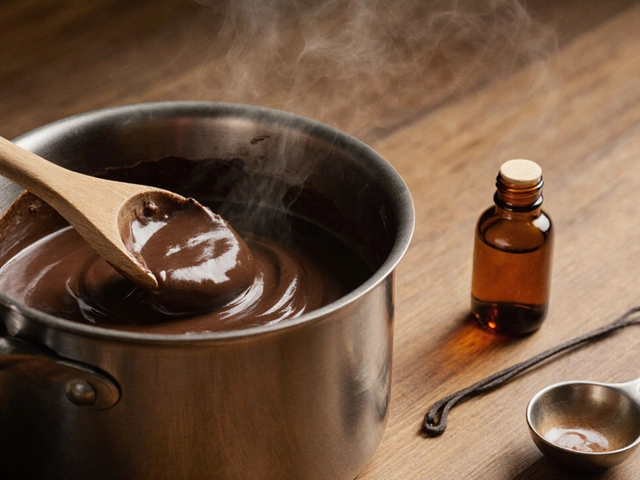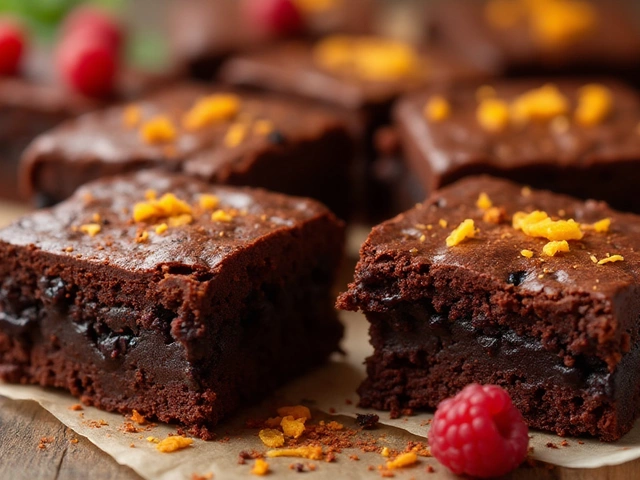
Delving into the world of vegan desserts uncovers a delightful realm where sweetness meets thoughtful, plant-based innovation. This journey is about more than just eliminating animal products; it’s about embracing ingredients that are kind to both the body and the planet. Vegan sweets have rapidly gained popularity among those who seek balance between indulgence and conscious eating.
Let's explore what makes a dessert truly vegan, typical ingredients that replace traditional ones, and reveal some common pitfalls to avoid. Whether you're a seasoned vegan or just dabbling into flavorsome dairy-free treats, the quest for indulgence without guilt awaits. Discover the art of vegan desserts and the magic behind making them irresistible.
- What Defines a Vegan Dessert?
- Common Ingredients in Vegan Desserts
- The Benefits of Choosing Vegan Desserts
- Misleading Ingredients to Watch Out For
- DIY Tips for Success in Vegan Baking
- Exploring Popular Vegan Dessert Recipes
What Defines a Vegan Dessert?
Exploring the world of vegan desserts invites us into a sweet domain brimming with creativity and sustainable choices. To truly understand what constitutes a vegan dessert, we first need to grasp the fundamental concept of veganism. Simply put, a vegan dessert is one made without any animal-derived ingredients, which includes dairy, eggs, and even honey. The absence of these typical dessert staples, however, doesn't equate to the absence of flavor or texture. Instead, it opens the arena for innovative substitutes that are every bit as delicious, if not more.
The transformation begins with replacing dairy-based components like milk and cream with plant-based alternatives. Almond milk, oat milk, and coconut milk are popular substitutes, each lending a unique taste to the finished product. Similarly, butter is often swapped with margarine or oils such as coconut or avocado, which provide the desired richness and texture. The egg, an essential ingredient in many traditional desserts, is arguably the most challenging to substitute. Yet, ingenious solutions such as flaxseed meal mixed with water, mashed bananas, or applesauce have proven effective in mimicking the binding and leavening properties of eggs.
Vegan sugar options vary as well, since some sugar is processed with bone char. Opting for organic sugar, agave syrup, or maple syrup ensures the sweetness remains intact without compromising on vegan principles. As consumers grow more conscious, ensuring these elements are genuinely vegan becomes crucial. The intricate journey of vegan dessert crafting isn't just about removing certain ingredients; it's about employing knowledge and creativity to produce something that indulges senses without costing the earth.
"Once we learn to respect the freshness and integrity of ingredients as a chef, then that awareness feeds our creativity." - Alice Waters
The heart of plant-based sweets lies not just in the ingredients, but also in the culinary techniques that emphasize flavor and nutrition. Advanced culinary techniques such as aquafaba—chickpea water as an egg white substitute—are becoming common in creating light and airy textures in meringues and mousses. Such innovations mirror the growing refinement in vegan dessert offerings, where chefs and home bakers alike experiment and refine their processes.
Understanding what defines these desserts carries implications beyond simple ingredient swaps. It also encompasses an ethos of sustainability and empathy for animals, aligning with many people's lifestyle choices. This ability to make compassionate choices without sacrificing indulgence is the essence of vegan desserts. Ultimately, what defines a vegan dessert is not just how it is made, but the joy it brings to those who choose a more conscientious path. This world of animal-free treats offers more than adjustments; it presents a reimagination of culinary potential, celebrating both taste and ethics in unison.
Common Ingredients in Vegan Desserts
Diving into the delightful realm of vegan desserts, you'll quickly discover the magic that a mix of unique and varied ingredients brings to the plate. These plant-based components not only replicate the textures and flavors of traditional sweets but occasionally enhance them. With conscious cooking on the rise, many are turning to these alternatives not just for ethical reasons, but for their numerous health benefits and creativity in the kitchen.
One of the prime movers in vegan desserts is nuts, a versatile component used for their rich protein content and creamy textures. Nuts such as cashews and almonds are often soaked and blended to create smooth, dairy-free cream bases. Almond milk and cashew cream have become the backbone of countless vegan dessert recipes, providing indulgent textures that make you forget all about the original dairy versions. Nuts also find their way into bases for many crusts, providing that much-loved crunch factor without needing butter or eggs.
Another group of stars in the vegan pantry is seeds, especially chia and flaxseeds, prized for their binding properties which are similar to eggs. When mixed with water, these seeds form a gel-like consistency that helps hold baked goods together. This discovery has altered the landscape of vegan baking, introducing possibilities for egg-free brownies, cakes, and cookies. With a multitude of benefits, including omega-3 fatty acids, chia, and flaxseeds do more than just keep your cupcakes intact; they add a nutritional punch.
Plant-based sweets often incorporate sweeteners that go beyond simple white sugar. Maple syrup, agave nectar, and dates find their place as favored alternatives, imparting unique flavors while maintaining the expected sweetness. These sweeteners are not just a swap in sugar content; they often carry additional nutrients and natural properties that elevate desserts from mere treats to nourishing bites. The robustness of dates, for instance, allows them to double as a natural binder, perfect for raw dessert recipes.
Fruits, both fresh and dried, play a pivotal role in flavor profiles of vegan sweets. Bananas, ripe and creamy, not only impart their delightful essence but also act as an egg substitute in many recipes. Applesauce similarly steps in as a humble, binding component that also curbs fat content when replacing oils. Meanwhile, berries offer bursts of color and antioxidant richness, making them a desirable addition to everything from pies to decorative toppings. It’s not just about flavor; fruits bring necessary vitamins and minerals, adding up to more than just a sugar hit.
"Using nature's ingredients gives me a sense of connectedness with what I create. Vegan baking is an art that captures the essence of whole foods." - A quote from a well-known vegan chef in 'The Modern Vegan Cookbook'.
Also essential in this mix are non-dairy yogurts and coconut cream, bringing in the much-desired creaminess to desserts like cheesecakes and mousse. Not just limited to desserts, these are vital in savory meals too, showcasing the flexibility of vegan ingredients. Considering options that cater to dietary needs, coconut milk-based ice creams have seen a surge, offering rich, creamy experiences without any animal involvement.
Flours like almond and coconut replace wheats, transforming baked goods into gluten-free marvels. For those sensitive or allergic to gluten, these alternatives open new doors in the taste and texture departments of traditional baking. Blend various flour types and adjust their proportions to achieve the right consistency, adding to the art of creating these glorious animal-free treats.
Each ingredient brings its unique palette, allowing dessert lovers, whether vegan or not, to experiment and innovate. This fascinating array of alternatives doesn’t just replace but elevates the traditional sweet experience, inviting everyone to indulge without compromise.

The Benefits of Choosing Vegan Desserts
When it comes to enjoying desserts, people often fear the guilt that follows indulgence. Switching to vegan desserts can transform this experience into a satisfying and guilt-free pleasure. The primary advantage of these plant-based sweets lies in their health benefits. They typically contain less saturated fat, as they eliminate the need for butter, cream, and other dairy products, often replacing them with healthy fats from nuts, coconut, and avocado. This means you can indulge without worrying about raising your cholesterol. Another key aspect is the emphasis on natural sweeteners like maple syrup, agave nectar, or dates. These alternatives can provide not just sweetness but also nutrients, making them a healthier choice over refined sugar.
Additionally, vegan desserts cater to a broad array of dietary restrictions. For those who are lactose intolerant or allergic to dairy, these treats offer a safe haven without sacrificing taste. Moreover, they align with ethical choices. Embracing animal-free treats aligns with the growing awareness of reducing animal suffering and minimizing environmental impact. Also, for many, choosing vegan desserts is a step towards a more sustainable lifestyle. The environmental footprint of producing plant-based ingredients is significantly lower compared to animal-derived counterparts. According to a study by the University of Oxford, cutting out dairy and meat can reduce an individual's carbon footprint from food by up to 73%.
"Choosing plant-based desserts not only nurtures personal health but fosters a sustainable planet,” says Dr. Maeve Flynn, a noted nutritionist and environmental advocate.
These desserts are not just diet-friendly but also rich in diversity and innovation. Cooks and chefs are increasingly experimenting with flavors and textures to create exquisite dessert alternatives. From raw vegan cheesecakes to aquafaba meringues, the possibilities are boundless. For many, this exploration opens up a culinary creativity that challenges traditional baking norms, making vegan desserts a thrilling endeavor both in creating and tasting.
Socially and culturally, these desserts are gaining prominence at events where inclusivity is crucial. Many catering services and restaurants now offer vegan dessert options as part of their regular menus, ensuring that guests with specific dietary preferences are accommodated without fuss. This growing trend reflects a significant shift in how desserts are perceived and offered, emphasizing inclusivity and health without compromising on flavor. It’s an evolution in the culinary landscape where everyone is invited to the table to revel in indulgence without boundaries.
Misleading Ingredients to Watch Out For
In the quest for delicious vegan desserts, it's important to stay vigilant about ingredients that might not be truly vegan despite appearing to be so. These are the sneaky saboteurs of those striving to maintain a plant-based lifestyle while enjoying sweet treats. Many ingredients can hide under unassuming names or disguise themselves in products thought to be animal-free.
Gelatin, for instance, is a common culprit. It's a staple in many dessert recipes but is made from the collagen of animal bones and skin. Opting for agar-agar, derived from seaweed, is a wonderful plant-based alternative. Additionally, dairy derivatives can be less obvious culprits. Casein, whey, lactose, and even certain types of lactic acid might lurk in seemingly innocent sweets, and they all stem from milk-based origins.
Another ingredient to be wary of is refined sugar. While sugar itself is plant-based, the refining process in some parts might involve bone char from animals to achieve that pure white color. To avoid this, look for sugar labeled as "organic," "unrefined" or "beet" sugar, as these methods typically do not involve bone char. Meanwhile, beware of certain colorings like cochineal or carmine, which derive from crushed insects to produce red hues, often used in desserts.
"Being vegan is not about being perfect. It is about doing the least harm and the most good," stated Jo Stepaniak, a well-regarded vegan author and activist, reminding us that awareness is key in these choices.
The Case of Hidden Honey
Honey often finds its way into dessert recipes and can deceive new vegans due to its natural image. However, honey is produced by bees and therefore doesn’t fit the vegan paradigm. Maple syrup, agave nectar, or brown rice syrup stand as great alternatives, offering similar sweet profiles without compromising ethical practices.An Unexpected Twist: Is There Milk in That?
Don't overlook chocolate. It's essential to verify that what you think is pure chocolate doesn’t include milk fat or solids, which are commonly added. The phrase "may contain milk" on packaging indicates cross-contamination risks for those highly sensitive or strict about their intake. Opt for dark chocolate labeled expressly as dairy-free to enjoy a truly vegan sweet indulgence.- Look for "vegan-certified" labels as a helpful guide.
- Read ingredient lists for hidden animal-based derivatives.
- Research companies known for ethical and animal-free production.

DIY Tips for Success in Vegan Baking
Embarking on the path of vegan baking is akin to setting out on an enchanting culinary adventure where every baked good is a testament to creativity and compassion. The essentials of making vegan desserts revolve around transforming traditional recipes into exquisite animal-free treats. First-time bakers often find substituting ingredients a bit daunting, yet it becomes second nature once the unique properties of these plant-based alternatives are fully appreciated. To ensure success, it’s crucial to familiarize oneself with the range of options available such as flax or chia seeds that excel as egg replacers. By mixing one tablespoon of ground seeds with three tablespoons of water, a gelatinous mixture results, akin to the consistency of an egg, imbuing your cakes and cookies with the necessary bind.
Apart from substituting eggs, choosing the right sweeteners and fats is equally essential in vegan baking. Swapping butter with coconut oil, margarine, or even avocado can maintain the rich texture and moisture in your desserts. Bear in mind that each of these options can bring its unique flavor profile to the table, potentially enhancing the taste of your pastries. When it comes to sweetening your confections, maple syrup, agave nectar, or dates can be remarkable replacements for conventional sugar. They offer a unique depth of flavor while maintaining the desired sweetness. A delightful evolution in vegan baking also lies in using aquafaba, the liquid from canned chickpeas, which can be whipped up into fluffy peaks, producing plant-based meringues or mousses with ease.
Understanding the chemistry behind these substitutes is pivotal for replicating textures and flavors successfully. With the absence of eggs and dairy, leavening agents like baking powder or baking soda become indispensable. Adding extra lift is sometimes achieved through incorporating acidic components, such as apple cider vinegar combined with plant-based milk, to create a DIY buttermilk that supports the rise and fluff in your batter. Experimentation is encouraged, as perfecting your plant-based sweets involves a bit of trial and error, but it is a challenge that pays off with scrumptious rewards.
As Isa Chandra Moskowitz, a renowned vegan chef, asserts, "Vegan baking is an opportunity to explore unique ingredients and expand your palate."
Whole grains, nuts, and seeds are advantageous additions that not only contribute texture and flavor but also boost the nutritional profile of your baked goods. Veering away from refined flours and opting for almond meal, oat flour, or coconut flour allows for a healthier, gluten-free approach without sacrificing taste. Almond meal, for example, imparts a delightful nuttiness while keeping your baked treats moist. For a more sumptuous crumblike texture, consider using a combination of flours to achieve the desired consistency. Though the switch to plant-based desserts may initially seem daunting, it opens up a world of flavor possibilities and dietary inclusivity that is rarely matched.
For those with a penchant for detail, here’s a quick table showcasing popular vegan alternatives and their traditional counterparts:
| Traditional Ingredient | Vegan Substitute |
|---|---|
| Eggs | Flax/Chia Seeds, Aquafaba |
| Butter | Coconut Oil, Avocado |
| Milk | Almond Milk, Oat Milk |
| Honey | Maple Syrup, Agave Nectar |
For seasoned bakers and beginners alike, embracing the art of vegan baking is rewarding, both for your taste buds and the environment. It’s a mindful choice that combines culinary enthusiasm with a desire to contribute positively to the world around us. So, roll up your sleeves, gather your go-to plant-based sweets ingredients, and immerse yourself in the thrill of vegan baking!
Exploring Popular Vegan Dessert Recipes
Vegan desserts have come a long way from their early days of being considered too bland or too difficult to make. Today, a vast array of vegan desserts has taken center stage in both home kitchens and professional bakeries. One can't help but notice the colorful display of enticing plant-based sweets on Instagram feeds and food blogs, showcasing that vegan doesn't mean missing out on indulgent treats. From decadent vegan brownies to creamy, dreamy ice creams, there’s a vegan dessert for every taste preference.
To begin with, let's talk about the ever-popular vegan chocolate cake. Moist, rich, and deeply chocolatey, this dessert is a crowd-pleaser and often made with simple ingredients like cocoa powder, almond milk, and flaxseed meal. The surprise comes with the ganache, which can be beautifully crafted from avocados for a smooth, rich texture—yes, avocados. This creamy fruit blends perfectly with dark chocolate, offering a healthier alternative to traditional heavy cream.
Another fan favorite is vegan ice cream. For those used to the creaminess of dairy, cashews have become the go-to ingredient. Cashews, when soaked and blended, create an incredibly creamy base that's perfect for nearly any flavor addition. Whether it's classic vanilla, vibrant matcha, or even lavender, vegan ice creams are revolutionizing frozen desserts. Imagine scooping out a luscious and scoopable ice cream made purely from nuts and coconut milk without any contribution from dairy cows.
“Vegan ice cream is not just for those who avoid dairy; it's a quaint adventure into flavors that tantalize your tastebuds in unexpected ways,” says Emily von Euw, author of Raw. Vegan. Not Gross. - Raw. Vegan. Not Gross.
No list of animal-free treats would be complete without the inclusion of vegan cookies. These are often the gateway dessert for those dipping their toes into dessert alternatives. Using ingredients like ground flaxseed as an egg replacement and a variety of non-dairy butters and oils, vegan cookies can achieve the desired chewy texture and flavor-packed taste. Peanut butter, cranberry almond, and timeless chocolate chip are just a few popular options that don't take a culinary degree to perfect.
Creating these delicious vegan sweets can be both satisfying and creative. Equally, for the more adventurous, vegan cheesecake offers a challenge that's fun to tackle. Typically made with cashews and coconut milk, accompanied by a graham cracker or nut-dates crust, vegan cheesecake mirrors traditional flavors but stands on its own, as a vegan star. Top it with seasonal fruits or a drizzle of fruit syrup for an exquisite touch.
For those eager to explore, here are a few tips on ensuring success: always taste the batter before baking, as tweaking flavors earlier is easier; using room-temperature ingredients helps achieve the right texture; and remember, practice leads to perfection. Every delightful bite of these homemade vegan desserts can be a small celebration of the balance between health and pleasure, all while remaining cruelty-free and earth-friendly.





